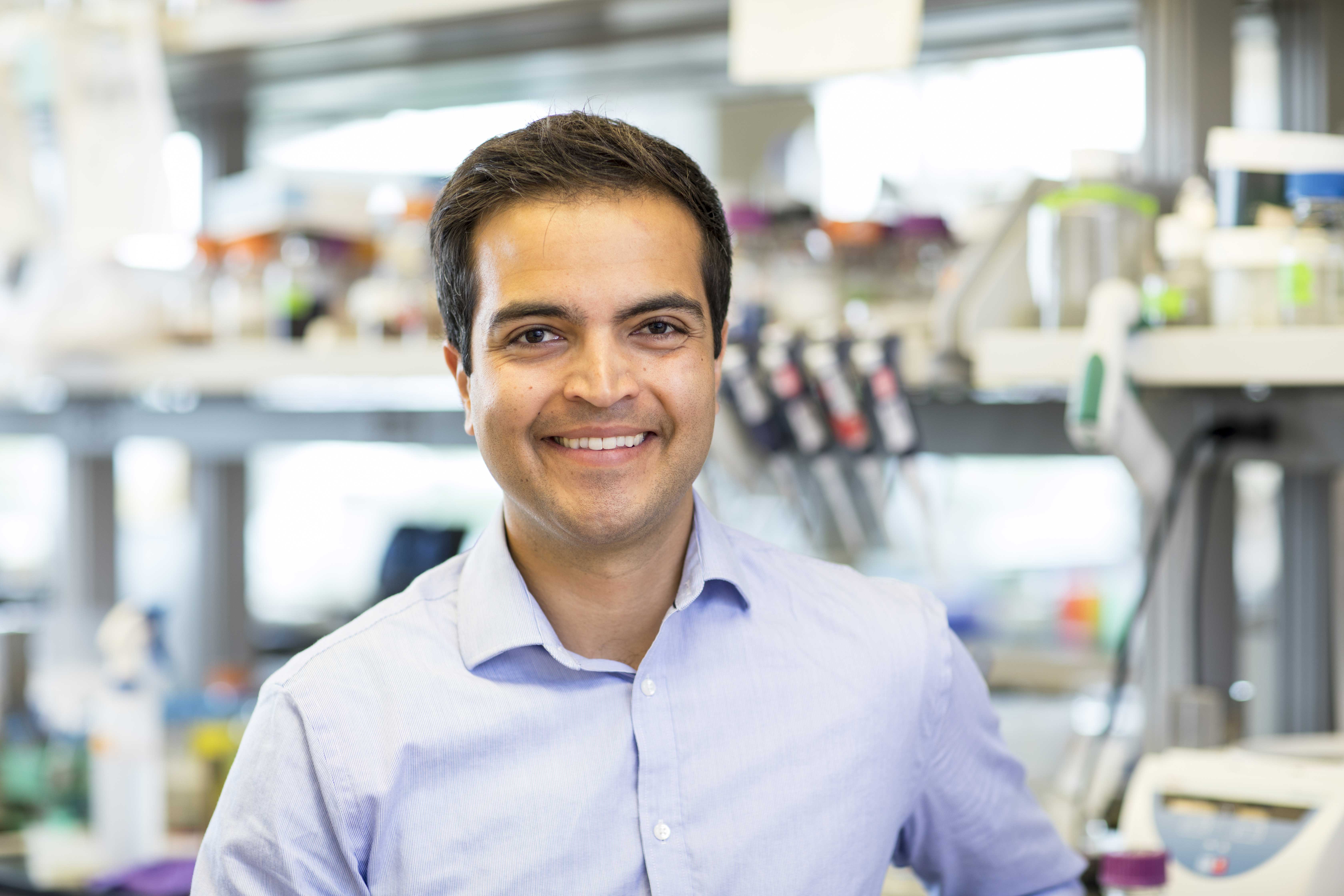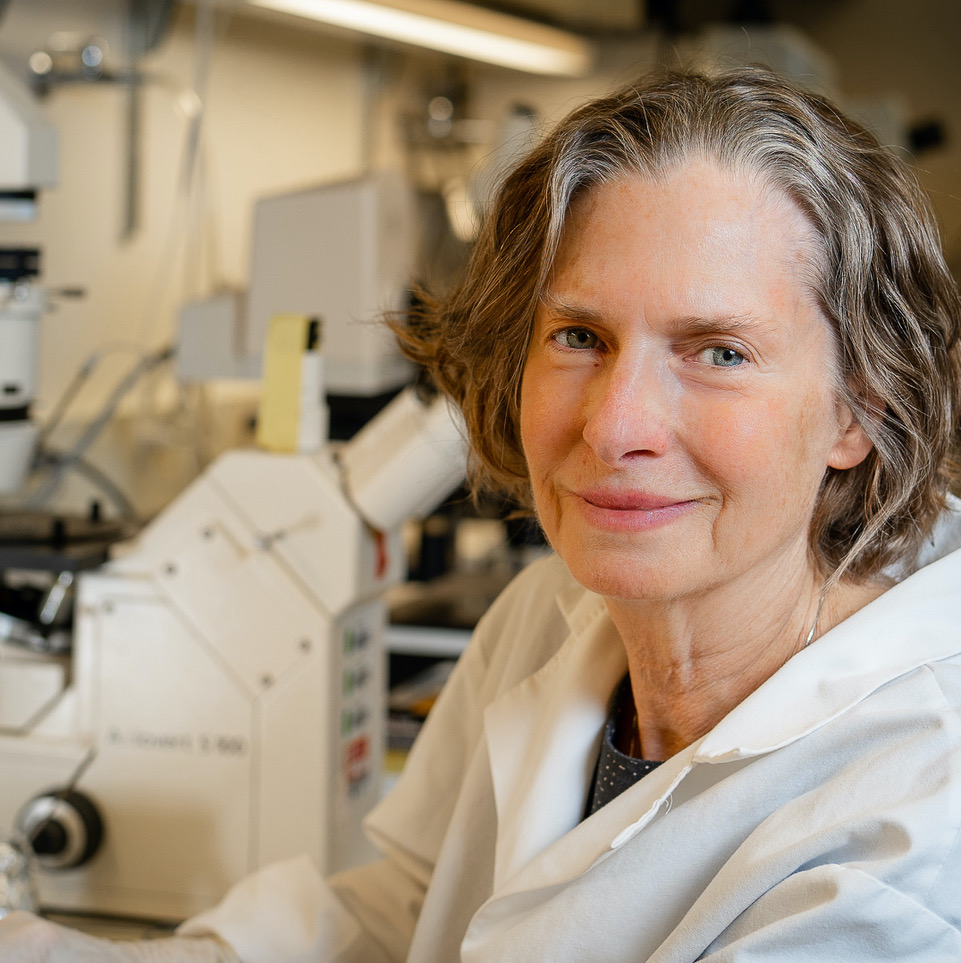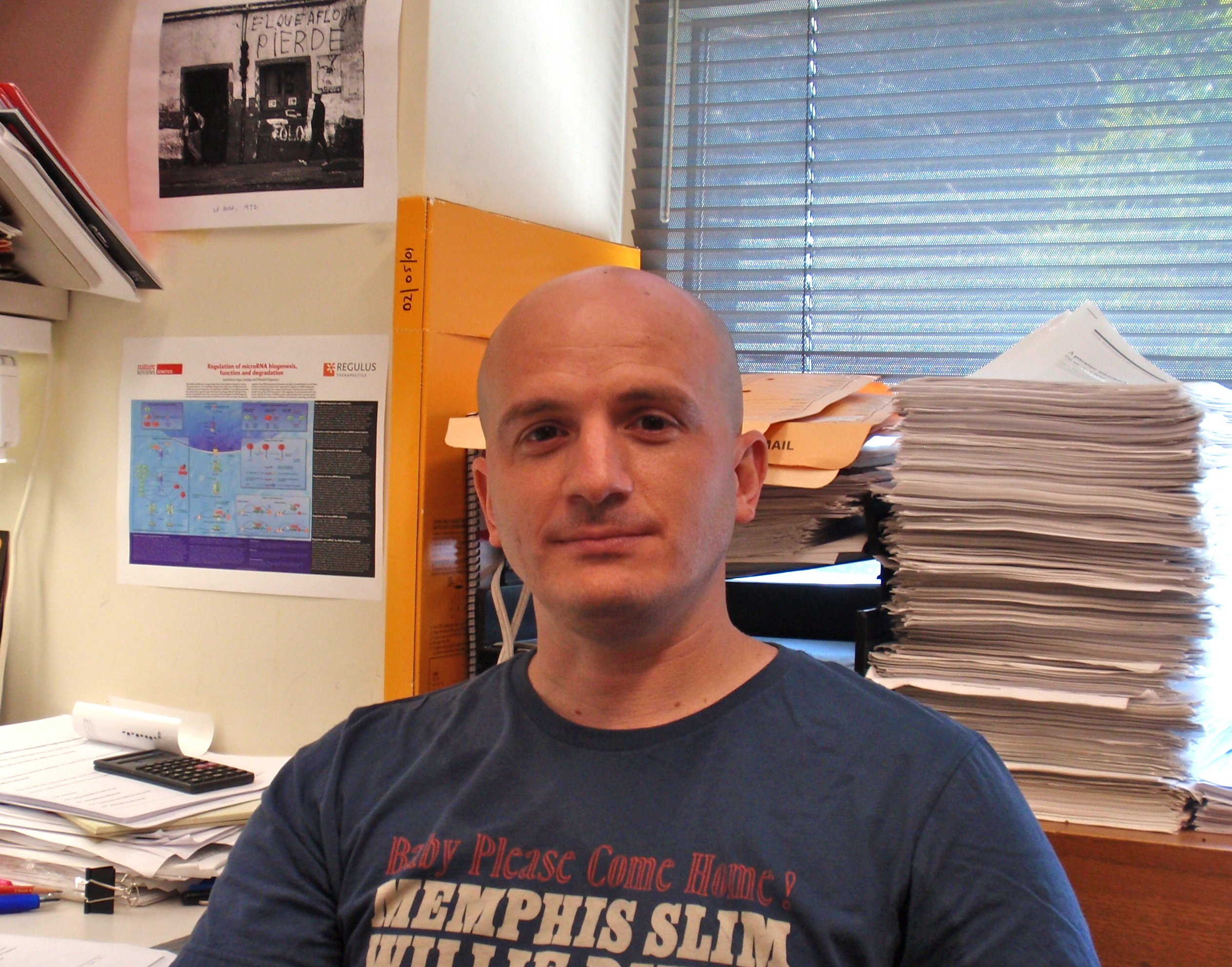Microbial Biology and Pathogenesis Research Emphasis Area
The study of microbiology and microbial pathogenesis is critical for the future of human health. Despite remarkable advances in the development of antibiotics, vaccines, and other anti-microbial therapeutics over the past century, the threat of infectious disease is escalating. The emergence, spread, and amplification of both new and well-known pathogens is driven by numerous factors, including climate change, urbanization, decreasing biodiversity, greater human population density, extensive travel, increasing numbers of immunocompromised individuals, and the overuse and misuse of antibiotics. Furthermore, there is a growing appreciation of the importance of microbes in the initiation, progression, and prevention of diseases, such as heart disease and neurological disorders, that were not traditionally linked with microbial agents. The catastrophic impact that infectious disease can have on human health and society across the globe is seen writ large by the ongoing COVID-19 pandemic. It is imperative that we train future investigators to tackle the many challenges posed by microbes in the 21st century, including emerging infections, the re-emergence of vaccine preventable diseases, and the rising tide of antimicrobial resistance.
The Microbial Biology and Pathogenesis Research Emphasis Area encompasses a diverse set of researchers from more than 16 basic and clinical departments and divisions from across campus. This interdisciplinary community creates an environment that ensures that mentors and trainees have regular opportunities for intellectual exchange and career-enhancing activities. Associated research groups include clinician-scientists and basic science investigators working on questions in microbiology, host-pathogen interactions, evolution, epidemiology, immunology, biochemistry, cell biology, and antimicrobial resistance. Key research areas of interest include:
- Stress adaptation, evolution, and emergence of viral, bacterial, and fungal pathogens, as well as parasites
- Use of microbes as tools to decipher gene regulation.
- Molecular genetics of pathogenicity
- Impact of drug resistance on pathogen prevalence and disease
- Development of new antimicrobial agents and vaccines
- Role of the microbiome in health and immune system development and activation
- Importance of genetic predisposition of the host to the outcomes of infectious challenge
- The impact of climate change on the ecology and range of infectious diseases and their vectors
- Structure, function, and biophysics of microbial nanomachines
- Mechanisms of innate and adaptive anti-microbial host defenses
- Genetic regulation of host responses to pathogens
- Structural and biochemical analysis of microbial virulence and fitness determinants, as well as host defenses
The Microbial Biology and Pathogenesis Research Emphasis Area is tightly integrated with several other training initiatives on campus, including those for Immunology and Chemical Biology.
- Microbial Pathogenesis Seminar Series (MPSS)
- Microbial Pathogenesis Training Grant Symposium
- 3i Initiative Symposium
- 3i Initiative Seminar Series
- Microbiology and Immunology Seminar Series
- Combined Clinical-Microbiology Conferences
- Microbial Pathogenesis Summer Journal Clubs
- Genetics Retreat
These monthly talks take place at noon on Fridays and bring in external, nationally recognized investigators from academics and industry with expertise in areas related to Microbial Pathogenesis. This venue brings together basic and clinical scientists and clinicians to create unique topic-driven discussions.
This event typically takes place in early November and provides a forum for trainees to present their research and receive direct feedback from their peers and other researchers from across campus, as well as visiting external speakers and world-class experts in diverse areas of Microbial Pathogenesis. This annual gathering also brings together interdisciplinary labs and affiliated departments to learn about new discoveries, novel techniques and approaches available in other laboratories, and highlights opportunities for collaborations.
The Immunology, Inflammation, and Infectious Disease (3i) Initiative encompasses a campus-wide community of over 200 investigators representing nearly every department at the University of Utah. Researchers focus on a wide range of topics, including, Inflammatory Bowel Disease, HIV/AIDS, Sepsis, Malaria, Cancer Immunotherapy, Influenza, and Multiple Sclerosis among others. The 3i Initiative hosts an annual spring symposium in late April or early May for all 3i community members (faculty, trainees, and staff) and includes external keynote speakers, internal speakers, and a poster session.
These monthly talks take place at noon on Fridays, oftengiven by local researchers from 3i departments speaking on a wide range of topics, including infectious diseases.
These monthly talks occur Fridays at noonSeptember through May, and cover a variety of topics centered around infection, microbial pathogenesis, immunology and inflammation.
This conference occurs once or twice per year and engages Infectious Disease Fellows, clinicians, and basic researchers with interests in Microbial Pathogenesis. These joint presentations focus on different aspects of intriguing clinical cases and are split between an ID fellow presenting the clinical aspects of a case and a Microbial Pathogenesis T32 trainee presenting the pathogenic mechanisms.
The summer journal club provides an excellent forum for students and postdocs to present and learn about state-of-the-art work in Microbial Pathogenesis research. Trainees enlighten the community about exciting new research in diverse areas.
Each year the Genetics Training Program holds an off-campus Annual Retreat Symposium that brings together members of the University of Utah’s Genetics research community. The Annual Retreat is open to all members of the U of U research community. All trainees present research talks; other members of the community are invited to present posters. In addition, leaders in the field of Genetics are chosen to speak based on their work in an area that is especially innovative or that touches on a broad array of genetic interests. The Annual Genetics Retreat provides many opportunities for informal interactions, and often touches upon topics of great relevance to Microbial Pathogenesis.
T32 Opportunities
Microbial Pathogenesis Training Program
Microbial Pathogenesis lies at the crossroads of Microbiology, Immunology, Infectious Diseases, and Host Defense. The Microbial Pathogenesis T32 Training Program is supported by NIH/NIAID and serves as a platform for integrated training of predoctoral and postdoctoral trainees by bringing together basic scientists and clinician scientists for the exchange of ideas and training at the University of Utah.
Contact:
Matt Mulvey, PhD - Program DirectorImmunology, Infectious Disease and Inflammation (3i) T32 Training Grant (3iTG)
The Immunology, Inflammation and Infectious Disease Training Program seeks to bring together faculty and trainees across the University of Utah Health campus to foster collaborative research in basic and translational immunology.
Contact:
Neuroimmunology T32 Training Grant
Neuroimmunology is a rapidly growing discipline at the intersection of immunology and neuroscience. The Neuroimmunology Training Program is designed to train and support future researchers in this field of study.
Karen Wilcox- Program Director
Alysha Stanton- Program Administrator
Training Program in Genetics (T32)
This NIH-funded T32 training grant supports pre-doctoral students who are applying genetic approaches to answer key biological questions in a variety of areas of importance to both basic and clinical research.
University of Utah Biomedical Informatics Training Grant (T15)
This training program empowers trainees through education and experience to be independent, innovative, and self-directed scientists who are able to transform data into knowledge and impact the manner in which knowledge is applied to real-world situations to improve the health of individuals and populations.
Karen Eilbeck – Program DirectorJake Pickett – Program Administrator
Microbial Biology and Pathogenesis focused Core Facilities
Research in the area if Microbial Biology and Pathogenesis Research is by necessity inter-disciplinary and often requires access to a broad spectrum of cutting-edge tools and methodological approaches. Researchers have facile access to numerous state-of-the-art core facilities, resources, and support via the Health Sciences Center, Huntsman Cancer Institute, and the University of Utah. These include:
- Bioinformatics
- Biorepository and Molecular Pathology
- Cell Imaging
- DNA Sequencing
- DNA/Peptide Synthesis
- Drug Discovery
- Electron Microscopy
- Flow Cytometry
- High-Throughput Genomics and Bioinformatics Analysis
- Mass Spectrometry & Proteomics
- Metabolic Phenotyping
- Metabolomics
- Molecular Diagnostics
- Mutation Generation and Detection Core
- Protein-Metabolite Discovery Core
- Research Histology
- Research Informatics
- Study Design And Biostatistics Center
- Transgenic Gene-Targeting Mouse Facility
*See also the Core Facilities Website
The University of Utah General Catalog
BIOL 5255 - Microbial Genetics
A project-oriented lecture/laboratory on use of experimental and analytical tools of modern genetics using bacteria and their viruses. It is recommended that BIOL 2020 and BIOL 2030 be completed prior to taking this course.
BIOL 5270 - Microbial Ecosystems
Microorganisms run the world. They are the foundation of every habitat on earth, from our bodies to the deep sea. The aim of this course is to train students to appreciate the fundamental microbial processes that are at the heart of many pressing medical and environmental issues today. The course is inherently interdisciplinary and will involve concepts in microbiology, genomics, ecology, evolution, and biogeochemistry. Students with any interest in medical, molecular, environmental, or evolutionary aspects of microbiology are welcome.
PATH 6410 - Molecular Virology
Basic knowledge of molecular biology is required. The molecular biology of virus lifestyle strategies, including cell entry, nucleic acid replication, gene expression, assembly of progeny virions, interaction with the host cell, and molecular epidemiology. The course will provide both a general introduction to the diversity of virus lifestyles and a detailed analysis of several of these strategies.
PHCEU 7011 - Fundamentals of Pharmacokinetics and Pharmacodynamics
This course will review fundamental aspects of pharmacokinetics with an emphasis on understanding concepts for compartmental and non-compartmental modeling, physiologic modeling, and modeling of targeted drug delivery systems. The goal of the course is to understand how these techniques can be used to optimize drug delivery.
PATH 7310 - Host-pathogen Interactions and Human Disease
This course will examine the mechanisms and consequences of microbial interactions with host cells and tissues. The means by which microbial pathogens stimulate and overcome host defenses in order to cause disease will be explored. This course is suitable for all graduate students and can be repeated up to three times for credit. Topics change annually. This is a half semester course, offered in the spring.
Bioscience Faculty





Protein Design, Viral Entry, Synthetic Biology, Chemical Protein Synthesis

Microbial Genetics and Biochemistry, Mucosal Immunology, Early-Life Host-Microbiota Interactions


HIV Biochemistry and Structural Biology, Virus-host Interactions, Innate Anti-viral Defenses



Protein evolution in viruses and immunity, SARS-CoV-2, HIV, Zoonosis, Molecular Evolution


Non-Bioscience Faculty























